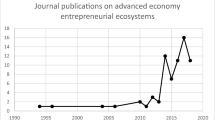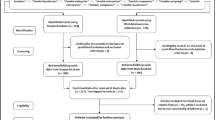Abstract
The possibilities of innovation development, as well as the creation and promotion of an innovative model of a region’s subsoil development, have several dimensions. Regional factors and conditions have the most importance among them. Practical interest in the regional level of administration consists in analysis of controllable factors. The paper discusses the theoretical base and experience of innovation development of the most successful resource-based countries. The analysis shows that the key role in innovation development is played by the state; national innovation systems are shaped with consideration of the resource-related specifics of the economy. Government regulation aims to wholly encourage entrepreneurship and private initiative; therefore, a considerable share of investment in scientific research comes from industry. The experience of innovation developed Russian resource regions (Tomsk oblast, the Khanty-Mansi Autonomous Okrug, and the Republic of Tatarstan) proves that the development of innovation sphere improved the regions’ image and conditions to attract investment and highly trained professionals. The innovation component can provide an impulse not only in the development of traditional production segments, but also in addressing socioeconomic problems of areas. A trend has emerged of taking into account regions’ resource profiles in their innovation development strategies, but there is still a lack of relations between the innovation sector and the region’s resource enterprises. The share of the resource sector in the structure of the economy is not a decisive factor (neither an obstacle) of successful innovation activity, since there are other significant factors and conditions. The regional governance level plays an important role in establishing and developing innovation processes: along with technological innovations, managerial, organizational and marketing innovations have become important; institutional transformations, political competencies, and the role of regional authorities come to the foreground; a good return can be achieved through active participation in federal initiatives to support innovation development.
Similar content being viewed by others
References
Bykovskii, V.A., West Siberian oil and gas sector: problems and solutions, Reg. Res. Russ., 2011, vol. 1, no. 4, pp. 331–335.
Golyashev, A.V. and Grigor’ev, L.M., Types of Russian regions: stability and shifts in 2003–2013: analytical report, 2014. http://ac.gov.ru/files/publication/a/4363.pdf. Accessed July 20, 2015.
Zhvachkin, S., New development trend of INO Tomsk. http://innovation.gov.ru/node/36628. Accessed November 3, 2015.
Knyazev, A.S., The results of implementation of the state program “Development of innovative activities in Tomsk oblast for 2011–2014” in 2013. http://duma.tomsk.ru/files2/26457_inno11_14.pdf. Accessed November 20, 2014.
Mikheeva, N.N., Comparative analysis of innovative systems of Russian regions, Prostranstvennaya Ekon., 2014, no. 4, pp. 61–81.
North, D., Institutions, Institutional Change and Economic Performance, Cambridge: Cambridge Univ. Press, 1990.
Pushkarenko, A.B., Osnovnye rezul’taty deyatel’nosti sistemy professional’nogo obrazovaniya Tomskoi oblasti v 2012 godu (Main Results of the System of Professional Education in Tomsk Oblast in 2012), Tomsk: Tomsk. Gos. Pedagog. Univ., 2013.
Reiting innovatsionnogo razvitiya sub”ektov Rossiiskoi Federatsii (Rating of Innovative Development of the Russian Federal Subjects), Gokhberg, L.M., Ed., Moscow: Vysshaya Shkola Ekon., 2015, no. 3.
Khalimova, S.R., Assessment of Russian regions by level of innovative development, Reg. Res. Russ., 2016, vol. 6, no. 2, pp. 115–124.
Acemoglu, D., Johnson, S., and Robinson, J., Institutions as the fundamental cause of long-run growth, in Handbook of Economic Growth, Aghion, P. and Durlauf, S.N., Ed., New York: Elsevier, 2005, vol. 1, pp. 385–472.
Autant-Bernard, C., Fadairo, M., and Massard, N., Knowledge diffusion and innovation policies within the European regions: challenges based on recent empirical evidence, Res. Policy, 2013, vol. 42, pp. 196–210.
Ericsson, M. and Soderholm, P., Mineral depletion and peak production, POLINARES Working Paper 2010, no. 7. http://www.polinares.eu/docs/d1-1/poli nares_wp1_peak_debates_minerals.pdf. Accessed April 15, 2014.
Heeks, R., et al., Inclusive innovation: definition, conceptualization, and future research priorities, Manchester Center for Development Informatics Working Paper No. 53, 2013. http://www.seed.manchester.ac.uk/medialibrary/IDPM/working_papers/di/di_wp53. pdf. Accessed June 18, 2015.
Todtling, F. and Trippl, M., One size fits all? Towards a differentiated regional innovation policy approach, Res. Policy, 2005, vol. 34, no. 8, pp. 1203–1219.
Author information
Authors and Affiliations
Corresponding author
Additional information
Original Russian Text © A.E. Sevastyanova, 2016, published in Region: Ekonomika i Sotsiologiya, 2016, No. 1 (89), pp. 209–232.
Rights and permissions
About this article
Cite this article
Sevastyanova, A.E. Creating the conditions for innovation development of resource-based regions. Reg. Res. Russ. 7, 1–9 (2017). https://doi.org/10.1134/S2079970517010075
Received:
Published:
Issue Date:
DOI: https://doi.org/10.1134/S2079970517010075




